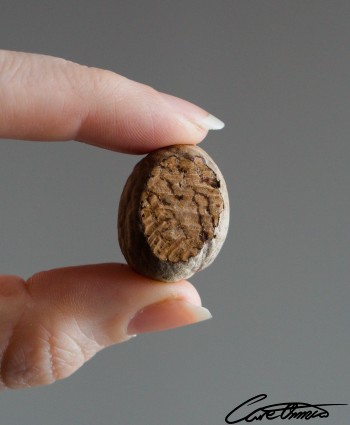What Is Nutmeg & What Is It Used For?

Nutmeg is a potent spice loved by many, especially around Christmas. Who doesn't want nutmeg in their eggnog?
But what else can you make with nutmeg? Nutmeg is a key ingredient in many baked goods. However, it's toxic when taken in larger doses. Can it still be healthy for you?
In this article, we explore what nutmeg is and what you can do with it.
Table of Contents
What Is Nutmeg?
The nutmeg originates from the Banda Islands in the Moluccas in Indonesia near New Guinea.
The nutmegs grow on trees that can grow up to 20 meters high, but it is not only the nut that is used as a spice but also the flower. The nutmeg flower is usually used in certain fish and vegetable dishes.
Nutmeg should not be consumed as is but only used as a spice. The nut is toxic in large quantities and should be used in moderation.
But no other nut contains as many carbohydrates as the nutmeg.
Is Nutmeg A Nut?
Nutmeg is not classified as a nut. Nutmeg is not botanically related to hazelnuts, almonds, and peanuts.
It means that allergy to nuts does not pose a known risk of reacting to nutmeg. Still, one should always be cautious when it comes to nut allergies.
What Does Nutmeg Taste Like?
Nutmeg is a nice but strong aromatic spice that dampens bland tastes of food and gives it a slightly peppery taste.
But use it in moderation so that it does not dominate and take over the flavor.
Is Nutmeg Poisonous?
Nutmeg is safe in small quantities. But in larger doses, nutmeg is toxic.
The effects of nutmeg haven't been extensively studied. But there are a few studies and case reports on the dangerous side-effects of consuming too much myristicin.
Myristicin is a substance that you find in nutmeg, with very unpleasant toxic side effects.
Myristicin can be found in several other spices and plants but is present in higher amounts in nutmeg.
Before using nutmeg read our article How To Use Nutmeg Safely! [Read This Before Using It!] to be on the safe side.
Is Nutmeg Healthy?
Nutmeg contains an impressive array of powerful compounds that may help prevent disease and promote your overall health.
Nutmeg might be able to:
- Promote digestion
- Treat insomnia
- Relieve pain
- Promote oral health
- Regulate blood pressure
Can Nutmeg Go Bad?
Whole nutmeg can stay fresh almost forever, but should always be stored away from heat and moisture.
But generally, the rule is that well-stored whole nutmeg will keep its freshness for about 4 years.
When stored properly, ground nutmeg will retain its freshness for approximately 2 years.
Nutmeg will lose potency over time.
So after years of storage or if stored incorrectly, the flavor and aroma won't be as intensive as they used to be.
In the end, it will hardly taste anything.
If nutmeg is stored wrong, it not only loses potency it might also mold.
For instance, if the nutmeg is exposed to water, mold starts growing immediately.
If you find mold on your nutmeg, throw it away at once.
How to test the freshness of ground nutmeg?
To test whether ground nutmeg is still potent enough to be effective, you can do the ground test
.
- Rub or crush a small amount in your hand
- Smell it
- Taste a little
If the aroma is weak and the flavor is not obvious, you should replace the ground nutmeg.
Can Nutmeg Help You Sleep?
Sleep is crucial for our health. Nutmeg contains tryptophan, which is an essential amino acid that increases the number of neurotransmitters.
Tryptophan has a calming effect that can help you fall asleep naturally, but also it can help you sleep through the night.
How to take nutmeg before bed
Take approximately 1/4 teaspoon, just a pinch, fresh nutmeg in 2 dl warm milk, and drink about an hour before bedtime.
Remember that nutmeg is toxic in high doses! Don't overdo it!
Nutmeg For Your Skin
Nutmeg contains substances that can be good for your skin.
Nutmeg's natural anti-inflammatory quality helps to reduce redness and pigmentation, providing a more even complexion.
Nutmeg has antibacterial and antimicrobial properties.
In skincare, it means that nutmeg can help in controlling sebum production.
But also getting rid of the trapped impurities that lead to acne.
Both of these are skin inflammation issues where you tend to get rashes and itchy skin.
Nutmeg has also shown the ability to even out discolorations and pigmentation on your face.
Nutmeg As Essential Oil
The essential nutmeg oil is a warming and spicy oil extracted from the fruit and seeds by steam distillation.
Nutmeg oil has a sharp scent with a musky tone that has made it popular in perfumes.
Nutmeg oil has long been used externally to relieve seasonal discomfort, especially combined with massage or a hot bath.
When used for spreading fragrance, the oil stimulates the senses and helps you relax your body and soul.
Nutmeg oil is a clear, light yellow, or light green oil that thickens and darkens or turns red-yellow over time.
Nutmeg In Food
Nutmeg works wonders in mashed potatoes, stewed vegetables, béchamel sauce, lasagne, spinach, cheese, and egg dishes.
Nutmeg is also used in pastries.
Nutmeg is often an ingredient in sausages, contributing to its peppery taste.
When you want nutmeg in your food, we recommend buying whole nutmegs and grate them yourself. That will give you the best results.
Uses of nutmeg
Nutmeg is a common ingredient in many cuisines. For instance:
You can sprinkle it over your breakfast oatmeal
Conclusion: Nutmeg - Both Tasty And Toxic
Nutmeg is a versatile spice that can brighten up many dishes.
It has a potent flavor that can be too much, so be careful.
Not only do you have to be careful with the taste but also with the amount of nutmeg you use.
Nutmeg is toxic in larger quantities.
But used as a spice in small amounts, it's a super spice that isn't just tasty, it's also very healthy!

